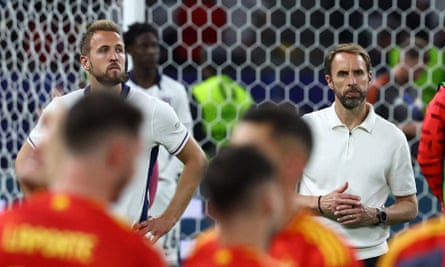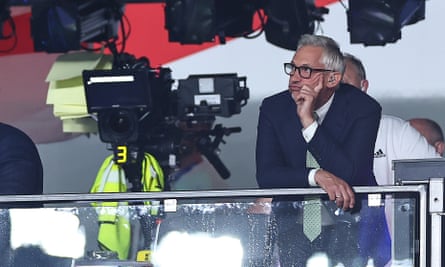Gareth Southgate looked ready to go at his post-match press conference deep in the cod‑classical grey concrete dungeon of Berlin’s Olympic Stadium. Not ready to go as in ready to crunch the data and plan for the Nations League date with Republic of Ireland in September, but ready to go, go.
Southgate has said he will “give myself a few days” to work out what to do next. This is in itself very Southgate. No doubt those days will be spent doing something moderate and restorative, walking the Jurassic trail, learning Mandarin, recording an inspirational Ted Talk called Dare To Dare or Managing To Fail.
There was a telling use of the past tense. Southgate called England, “England”, not “us”. This wasn’t a frazzled Roy Hodgson in Nice, looming up on a wonky camera feed looking like a vampire on the way back from an all-night casino. Southgate has seemed a little more drained than usual at this tournament, adopting during most of his public interactions the expression of a disappointed antelope being asked to explain calculus to a remedial group of angry toddlers. But in Berlin he looked more or less at peace, despite the pain of the moment.
We can shout at the coach for the apparent war crime of not being as good as we wanted him to be, for not expressing a footballing culture as deeply layered and tactically coherent as the one Spain can draw down on. France, Italy, Argentina and Spain have won trophies in Southgate’s time, nations powered on by an all-time genius, a constant talent production line and the style template of the age. Italy is the one that got away. England could have won that before penalties. But in time the noise will fade and the numbers will tell the story: two finals and a semi-final for a nation that previously had one final and two semis in its entire history. It requires an astonishing degree of cognitive dissonance, a view of the world completely at odds with the inconvenient facts, to claim that this is anything other than good.
Yet all things reach an end point. Entropy is a natural process. Eight years and four tournaments is a life cycle. We hear that the players like the environment and want more. But maybe what the players think isn’t the thing. Maybe they need something new. Maybe we all do. This feels like an England era that is now all played out. So what next?

Euro 2024 has confirmed two important things. First, the England team matters to people. The interest in these tournaments has been profound. International football has its problems, not least being stretched thin at the edges by the club football greed-rodeo. But in England it is still vital, visceral and profitable, an unslaked yearning that will continue to roll on.
Second, the manager is a vital figure even now. This isn’t logical. International football is at bottom a test of systems and cultures, not personality. But it is still the way it works in this ceremonial psychodrama. Southgate himself has been vividly present in the iconography of daily life, oddly so for an essentially private figure, out there floating in his tin can, exposed to all that light and hunger, and of course required to serve as a public rage piñata whenever defeat happens.
With this in mind, here is a suggestion. Assuming Southgate will now leave, the Football Association should go all out to hire Jürgen Klopp. Klopp might not want it. He must surely have competing plans. He is perhaps too big for the job. But he would be absolutely perfect.
Two points lead to this conclusion. The England manager is still the single most culturally and economically important figure in English football. But the English, despite being obsessed with managers, also don’t make managers. There is nobody in domestic football equipped to carry this on. Eleven elite Spanish club coaches had players in the two squads on Sunday, including the dominant tactical figure of the past 25 years. English football was represented by two; Sean Dyche and Eddie Howe, neither of whom have won a major trophy.
And second, what happens now is crucial. There is a suggestion the FA may not be able to afford Klopp on the current budget. Come off it. The England team made between €5m and €8m from reaching this final. Spend it on a proper manager. Get a bespoke sponsor. Get Tesco to pay for it.

Klopp is, like Southgate, a culture builder, a process guy. He has the warmth and charisma to recharge the stage. He’s like Southgate’s cooler, taller, much more successful cousin. But he’s also a proven elite modern coach. Klopp is also Total Premier League, has nurtured English players, has understood and progressed the tactical culture. He might like the hours. There’s no need to live all the time in the country. Let him wear a baseball cap. Make it work.
In return England have a settled culture and good young players. What they need is warmth, fun and energy, plus that degree of coherence and in-game control that has proved to be just out of Southgate’s reach. In many ways Klopp is almost too good. Can you hire rock‑star-Father-Christmas for a role that is essentially the nation’s PE teacher?
There is also something else. Should this happen – and there is no actual evidence to suggest it will – then we would at least know. If this group of players and that embedded culture, boosted by one of the great coaches of the age can’t get closer to winning something, it probably is time to ask whether the problem, in the end, might just be us. This is perhaps the most important thing worth saying about the (likely) end of Southgate. There are things to be learnt from another losing final.
The first is the treatment of the England manager. Frankly the environment Southgate has had to negotiate has been extraordinary in its hostility, its relentlessness, its lack of reason. The way people have spoken about a nice, decent, totally committed man is not just unacceptably toxic but deeply depressing. From ex-pros looking for clicks and leverage, to every gabbling head with access to fingers and a smartphone, there has been a barrage of disrespect, ignorance and mean-spiritedness. English football and English people should feel a deep sense of regret about this.
In many ways Southgate’s achievements with the team are even greater given they have come against the backdrop of such extraordinary noise. Sir Alf Ramsey locked the front gate and took the phone off the hook after England won the World Cup in 1966. Southgate has to deal with the hive mind, the constant digital scream, the howls and wails. Imagine trying to function with any clarity in that field of static.

And this is, of course, one more reason why England lose. Not the main reason, but another burden to carry. It is worth remembering just how dark, how grim, how poisonous some parts of the last European Championship final at Wembley were. The nation had spent the previous year and half sweating in its cave, dreaming of escape. It came out in joy, release, arse-rockets above the skyline, and finally in rage, tantrums and racist abuse. Some of the players still don’t seem to have fully recovered from the experience.
after newsletter promotion
The abuse, the questioning of competence and character, is an echo of that same inarticulate rage. And of course England are closer to losing every time this happens, a dark cloud made worse this time around by the encouragement to pile on from celebrity pundits and podcast-hawkers of unusual reach and profile.
It is accepted that “the media” has habitually destabilised England teams. But “the media” has changed. This time around the only people in the country who actually seem to like and respect Southgate are the newspaper reporters. Whereas the rage merchants, the abusers, the doorsteppers, have become everyday people on social media.
The media is Nigel250734 whose avatar picture is an involuntarily celibate lion. The media is also Gary Lineker’s hard-hitting banter‑podcast. Who knows, perhaps Lineker even has some credit to be taken here, uniting with a single needlessly sensationalist comment the players, manager and press in at least one common cause, the cause of not really liking Gary Lineker very much. Maybe this was all a secret masterstroke and he actually deserves some credit for England getting to another final. Hail: the Shitfather.
This environment has been a problem for the team, one Southgate thought he had mitigated by fostering warmer relations with traditional media. One thing is certain: whoever the FA hires next, you hope they will get better treatment.
The second lesson is more simple, and purely football. Spain remain the model. Spain have won four trophies this century, have dominated the coaching culture, producing players able to see and interpret the game on their feet.
By the same token, whatever mistakes Southgate has made, he is essentially an embodiment of the culture that made him. What are we expecting here? Johan Cruyff? Marcelo Bielsa? There is no English school, no English way. The tactics and style must always be gouged out of the air, imposed, learnt by rote.
And while England have some very good players, this can be misleading. English players win things, but they do so with Rodri, Luka Modric and Erling Haaland next to them while being managed by Pep Guardiola and Carlo Ancelotti.
And moving a little deeper, it is probably worth having a think about the culture the England team is required to reflect. There is a basic contradiction at the heart of football coming home. What kind of home is this exactly? What would it really mean if England had won this tournament? What method is the rest of the world supposed to admire and copy here? Create celebrity players. Have no coherent coaching school of your own. Rinse your national sport as a cash cow. Neglect your grassroots. Perhaps the real reason football can’t come home is because no adequate home has been constructed.
The success of the academies and Southgate’s work have thrown a grappling hook across that divide since 2016. But the Premier League is basically a piece of staging, a global light show. It imports wholesale the talent and methods of other cultures. Its academy kids, the bulk of this England team here, are removed from the grassroots system and trained in elite facilities. For England to win a trophy would be tribute to an exceptional private enterprise; but not some triumph of the national sporting culture. And yes it is also deeply English to act as a cultural magpie, to borrow and synthesise and outsource. Hiring Klopp would be a very exciting example of this.
For now, it is perhaps time to accept that teams always die in the end, that England have got to the final here while also at times resembling a group of players running on reserve battery. Southgate deserves gratitude and a fond farewell. Managing England is an exhilarating, draining, addictive public existence. Knowing how to let it go is also a skill.
Source: theguardian.com


